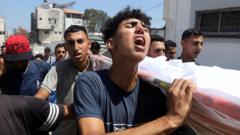A surge in violence involving Islamist factions and the Druze minority near Damascus has intensified fears of further unrest in Syria. Following airstrikes by Israel targeting alleged violence against Druze civilians, the bloodshed has resulted in over 100 fatalities, further complicating an already fractured post-Assad landscape.
Alarming Violence Erupts in Druze Regions of Syria Amid Ongoing Conflict

Alarming Violence Erupts in Druze Regions of Syria Amid Ongoing Conflict
Recent clashes between armed factions and Druze fighters near Damascus illustrate the fragile security landscape in Syria, as external forces like Israel intervene to protect vulnerable communities.
The deadly clashes between Islamist militants, Druze fighters, and security forces near Damascus have sparked renewed concerns about the continuing instability in Syria, which has been marred by years of civil war. The spiritual leader of the Druze community, Sheikh Hikmat al-Hijri, condemned the recent violence as an "unjustifiable genocidal campaign," reflecting the heightened tensions following ongoing conflicts.
The Syrian government has reportedly deployed security forces to Ashrafiyat Sahnaya, a Druze district, to quell the violence attributed to "outlaw groups." In response to the escalating unrest, Israel conducted airstrikes aimed at protecting Druze civilians, asserting its role as a defender of the community amidst the chaos. The clashes were provoked by misleading social media information that incited animosity against the Druze.
According to the Syrian Observatory for Human Rights, these recent outbreaks of violence have claimed at least 101 lives, comprising both Druze community members and security personnel. The fatalities include 71 Druze, among them 10 civilians, and substantial losses within the ranks of the security forces and supporting factions.
While a temporary lull seems to have descended over the region, previous outbreaks of hostilities underscore the precariousness of the prevailing ceasefire agreements. The complex interplay between various factions within Syria, compounded by the interests of foreign nations like Israel and Turkey, continues to fuel tensions. Israel's claims regarding its necessity to demilitarize regions near its borders further complicate the situation.
The Syrian government, now striving to unify fragmented regions and establish a semblance of order, faces mounting challenges. The shadow of distrust hangs heavy over relations with religious minorities and as the nation grapples to stabilize, the goal of fostering a peaceful, prosperous future for its citizens remains an uphill battle. Continued international support and careful navigation of the surrounding geopolitical landscape are essential for Syria's path to recovery from the longstanding conflicts that have devastated its populace.
The Syrian government has reportedly deployed security forces to Ashrafiyat Sahnaya, a Druze district, to quell the violence attributed to "outlaw groups." In response to the escalating unrest, Israel conducted airstrikes aimed at protecting Druze civilians, asserting its role as a defender of the community amidst the chaos. The clashes were provoked by misleading social media information that incited animosity against the Druze.
According to the Syrian Observatory for Human Rights, these recent outbreaks of violence have claimed at least 101 lives, comprising both Druze community members and security personnel. The fatalities include 71 Druze, among them 10 civilians, and substantial losses within the ranks of the security forces and supporting factions.
While a temporary lull seems to have descended over the region, previous outbreaks of hostilities underscore the precariousness of the prevailing ceasefire agreements. The complex interplay between various factions within Syria, compounded by the interests of foreign nations like Israel and Turkey, continues to fuel tensions. Israel's claims regarding its necessity to demilitarize regions near its borders further complicate the situation.
The Syrian government, now striving to unify fragmented regions and establish a semblance of order, faces mounting challenges. The shadow of distrust hangs heavy over relations with religious minorities and as the nation grapples to stabilize, the goal of fostering a peaceful, prosperous future for its citizens remains an uphill battle. Continued international support and careful navigation of the surrounding geopolitical landscape are essential for Syria's path to recovery from the longstanding conflicts that have devastated its populace.





















